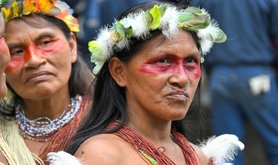
Five lessons from Argentina’s feminist movements’ fight for legal abortions
The country’s ‘Green Tide’ of feminist activists succeeded despite all the challenges of COVID-19, thanks to their resilience and reinvention

In December 2020, Argentina’s parliament approved a bill to legalise abortion on request up to the 14th week of pregnancy. Abortion is now legal, free and safe in South America’s second-largest country.
While other countries attempt to criminialise (or recriminalise) abortion, it was a huge victory for Argentina’s feminist movements. These movements, which continued to campaign for legalisation throughout the COVID-19 pandemic and one of the world’s longest and strictest lockdowns, can teach us how to succeed despite overwhelming challenges.
I moved to Buenos Aires in February 2020 to learn with and from feminist movements fighting to legalise abortion, as part of my doctorate. I immediately felt the energy of the Marea Verde (Green Tide), the wave of feminist movements campaigning for sexual and reproductive rights and bodily autonomy. The Marea Verde was everywhere in the capital, making the colour green synonymous with the fight for legal abortion.
People of diverse ages, backgrounds and ethnicities organised meetings, parties and protests on an almost daily basis. Pibas (teenagers), históricas (feminists over the age of 70), immigrant and Indigenous women, and trans people – all came together with a common goal: defending the autonomy of their bodies. All indicators suggested that the bill to legalise abortion would be approved in the first few months of 2020.
We’ve got a newsletter for everyone
Whatever you’re interested in, there’s a free openDemocracy newsletter for you.
But then the world suddenly stopped. The COVID-19 pandemic arrived in Argentina and highlighted what feminist movements have been saying for years: the importance of the work performed by women and feminised bodies, such as nursing, caring for children or the elderly, cleaning – all of which are often overlooked or not recognised as work. The pandemic also highlighted what these movements have been denouncing: the crisis of social reproduction and inequality.
The government ordered a mandatory lockdown, and everything came to a halt. Only those services considered essential were open (supermarkets, pharmacies, hospitals and clinics), and one could leave the house only for essential purposes, staying within 500 meters from the house. Gatherings were prohibited and a curfew of 8pm was strictly enforced.
All of this deepened already abyssal inequalities. As Georgina Mansilla from the resistance movement, La Poderosa (The Powerful), told me, “How can they tell us to stay at home if we don't have enough [money] to buy food? How can they tell us to wash our hands, if we don't have water or basic sanitation?”
We have the vocabulary and tools to understand, to resist and to strengthen our networks
In this context, feminist movements in Argentina had to rethink their strategies. Ruth Zurbriggen, one of the founders of La Revuelta (The Revolt), a feminist collective that accompanies those having abortions, told me: “Feminist movements in Argentina have a place, a place that is ours – and it is on the streets. A place for meetings, parties, and demands.”
Similarly, Carolina Comaleras of the Campaña Nacional por el Derecho al Aborto Legal, Seguro y Gratuito (National Campaign for Legal, Safe and Free Abortion), said that “the streets nurture us”. It is on the streets that “we produce heterogeneous and transversal policies,” said Luci Cavallero from the feminist movement, Ni Una Menos (Not One Less).
But even without ‘the streets’, the Marea Verde did not stop. It reinvented itself and found creative ways to articulate and advance the fight. As Cecilia Palmeiro, of Ni Una Menos, said: “We have the vocabulary and tools to understand what is going on and […]... to figure out ways to resist […...] and to strengthen our networks.”
Five strategies to push forward
Argentina’s feminist movements adapted and changed some existing strategies to deal with the challenges presented by the pandemic. I have identified and outlined five of these below:
1) Expanding online mobilisation
They were already using virtual tools, but the need for virtual spaces and online mobilisation increased significantly during the pandemic. There were virtual workshops, debates, vigils, protests and celebrations. Schools and universities joined in, offering courses on abortion from legal, social and medical perspectives. Virtual activities took place almost weekly, attracting hundreds of participants and reaching new and different groups.
2) Continuing and expanding abortion care and support
They emphasised the need for support networks during pregnancy terminations. As a result, despite the lockdown, those networks not only continued their invaluable work, but the number of volunteers joining them rose significantly. Moreover, these feminist movements pressured the government into issuing permits so that pregnant people could access legal abortion services.
3) Refining lobbying strategies
In 2018, the abortion bill was approved by Argentina’s House of Representatives but failed to pass the Senate. Mauricio Macri, president at the time, also opposed the bill. Learning from that experience, the feminist movements increased pressure on the Senate and the new president, Alberto Fernández, who was in favour of the bill.
The Marea Verde became more globalised, working to promote abortion outside of Argentina too
4) Boosting international networks
International feminist networks were established or amplified during the pandemic, from Paraguay to Canada to Australia. The Marea Verde became more globalised and connected, working to promote abortion not only in Argentina but abroad, too. In Argentina, for example, we mobilized to support abortion in Brazil. From Buenos Aires, I helped campaign against the Brazilian government, which tried to prevent a pregnant ten-year-old girl from getting an abortion after her uncle had raped her (for four years). After significant local, regional and international pressure, the girl was able to access a safe abortion.
The amplification of such international groups led to the launch in May 2021 of the Red Compañera, a network of organisations in 15 Latin American countries that accompany and support those having abortions.
5) Innovative physical intervention
Not everything was virtual: the Marea Verde also staged in-person interventions, too. On 28 May 2020 – the 15th anniversary of the launch of the National Campaign for Legal, Safe and Free Abortion – the streets of Buenos Aires were awash with green. Although it was not possible to celebrate outdoors, the Marea Verde covered the city with green posters demanding the legalisation of abortion.
The Marea Verde also organised actions that everyone could participate in at home, from banging pots and pans to putting up banners and flags. In November 2020, at the end of Argentina’s 234-day lockdown, socially distanced caravans of cars, bicycles and motorbikes took to the streets to demand the approval of the abortion bill.
Throughout lockdown, the Marea Verde managed to keep the abortion debate high on the political and social agenda, and pressure Congress to make abortion legal, safe and free for anyone who can become pregnant. Since the abortion bill was approved, the movement has continued working, to ensure the law becomes reality for everyone in the country.
On 28 May 2021, the federal government issued a 100-page protocol detailing all aspects of how to implement the abortion law.
The legalisation of abortion in Argentina shows how the resilience, perseverance and adapted strategies of feminist movements can inspire us to keep pushing until Ni Una Menos becomes a reality.
Read more
Get our weekly email




Comments
We encourage anyone to comment, please consult the oD commenting guidelines if you have any questions.